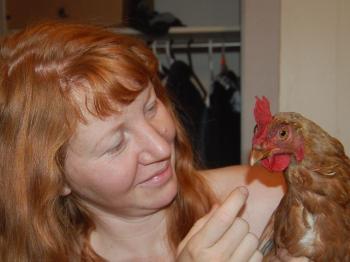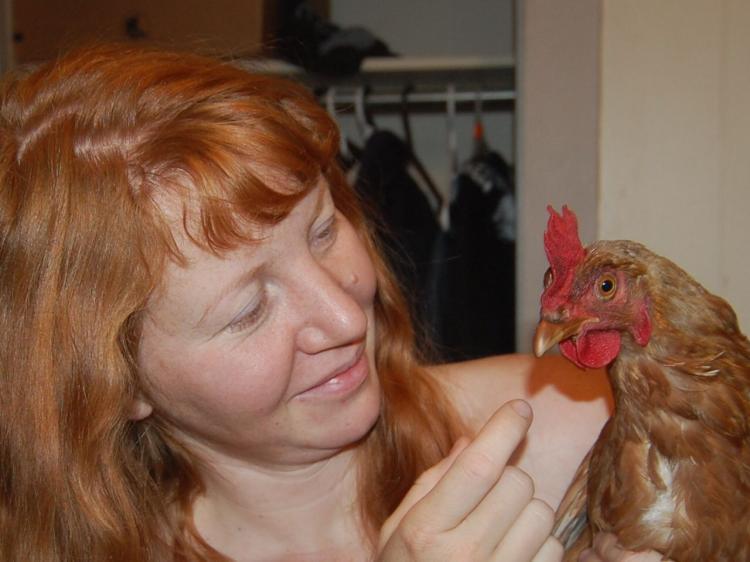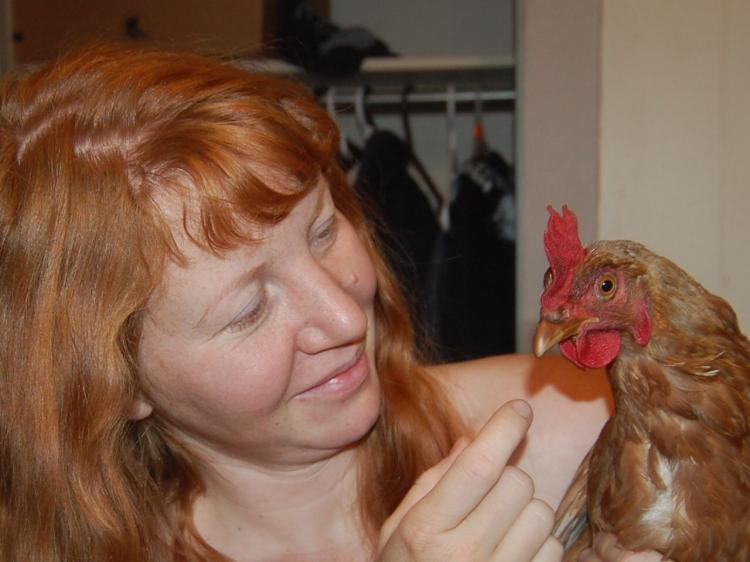The fight for the right to keep backyard chickens in Calgary has moved up a notch with a mother of three deciding to go to court rather than pay a $200 fine.
Mary March received the fine in August after she refused to follow a City of Calgary order to remove the three hens she keeps in her back yard within 30 days. March violated a city bylaw that forbids raising livestock in most urban areas.
March believes she should be allowed to keep the chickens, which produce two to three eggs a day, to help feed her children.
“I just want to work to get that bylaw removed. I think it’s against people’s right to have that bylaw in the first place,” she says.
“The U.N.’s declaration of everybody’s right to food is kind of what I’m going by. I don’t see how they are going to be able to go against that, but I guess I’ll have my day in court; we’ll see.”
March is supported by CLUCK, the Calgary Liberated Urban Chicken Klub, which wants the bylaw changed to allow residents to keep up to six hens. Noisy roosters would not be included.
“People in New York can raise chickens and other progressive open minded communities can raise chickens. And yet in Calgary, with all of our space, oh no, chickens—that’s over the top,” says CLUCK organizer Paul Hughes.
Hughes, also founder and chair of the Calgary Food Policy Council, is a food activist who wants Calgary’s unused spaces put to use for growing food. He says March’s day in court on April 1, 2010, will help put the issue of food security front and centre.
“In Calgary we’re about to sit down and talk about sustainable agriculture 101, human right to food 101. School’s in session on April Fool’s Day, 2010—that’s where it starts. We’re going to start to create that argument about why it’s important to fundamentally have a right to food.”
The first Calgary Food Summit, scheduled to take place on Oct. 16—World Food Day—will also help get Calgarians “dialoguing about food,” he says.
Bill Bruce, director of Animal and Bylaw Services with the City of Calgary, remembers that when backyard hens were allowed in Calgary, complaints were common.
“Keeping chickens is one of those things that sounds very cute at the onset, but I’ve talked to people who live next door and they cite things like noise, smell, waste and bugs attracted by the barnyard atmosphere,” Bruce told the Calgary Herald.
“On a big enough lot, they’re probably not a problem, but the average city lot is pretty tiny and that’s why we have the livestock ban.”
On June 23, a new bylaw went into effect in Regina prohibiting backyard chickens and other small livestock within the city limits.
Cities that allow backyard chickens within city limits in Canada are Victoria and a handful of other British Columbia communities including New Westminster and Burnaby. Vancouver is working on amending its bylaws to allow backyard chickens.
Chicken advocacy groups in many cities across the country have been lobbying for amendments to municipal regulations forbidding hens in urban areas. More than 300 cities in North America, including New York, have changed their bylaws to allow chickens.
“I personally know about 30 to 40 families [in Calgary] who are keeping chickens,” says March, adding that there are many benefits to having chickens, including healthier eggs and less bugs in the summer.
“I swear we had no mosquitoes this year—the chickens ate them all,” she says.
“It’s such a good feeling to eat food that you’ve made yourself, that you’ve helped produce, and you’ve taken care of the animals. It’s like growing your own garden. It’s such a rewarding feeling to sustain with chickens.”
Mary March received the fine in August after she refused to follow a City of Calgary order to remove the three hens she keeps in her back yard within 30 days. March violated a city bylaw that forbids raising livestock in most urban areas.
March believes she should be allowed to keep the chickens, which produce two to three eggs a day, to help feed her children.
“I just want to work to get that bylaw removed. I think it’s against people’s right to have that bylaw in the first place,” she says.
“The U.N.’s declaration of everybody’s right to food is kind of what I’m going by. I don’t see how they are going to be able to go against that, but I guess I’ll have my day in court; we’ll see.”
March is supported by CLUCK, the Calgary Liberated Urban Chicken Klub, which wants the bylaw changed to allow residents to keep up to six hens. Noisy roosters would not be included.
“People in New York can raise chickens and other progressive open minded communities can raise chickens. And yet in Calgary, with all of our space, oh no, chickens—that’s over the top,” says CLUCK organizer Paul Hughes.
Hughes, also founder and chair of the Calgary Food Policy Council, is a food activist who wants Calgary’s unused spaces put to use for growing food. He says March’s day in court on April 1, 2010, will help put the issue of food security front and centre.
“In Calgary we’re about to sit down and talk about sustainable agriculture 101, human right to food 101. School’s in session on April Fool’s Day, 2010—that’s where it starts. We’re going to start to create that argument about why it’s important to fundamentally have a right to food.”
The first Calgary Food Summit, scheduled to take place on Oct. 16—World Food Day—will also help get Calgarians “dialoguing about food,” he says.
Bill Bruce, director of Animal and Bylaw Services with the City of Calgary, remembers that when backyard hens were allowed in Calgary, complaints were common.
“Keeping chickens is one of those things that sounds very cute at the onset, but I’ve talked to people who live next door and they cite things like noise, smell, waste and bugs attracted by the barnyard atmosphere,” Bruce told the Calgary Herald.
“On a big enough lot, they’re probably not a problem, but the average city lot is pretty tiny and that’s why we have the livestock ban.”
On June 23, a new bylaw went into effect in Regina prohibiting backyard chickens and other small livestock within the city limits.
Cities that allow backyard chickens within city limits in Canada are Victoria and a handful of other British Columbia communities including New Westminster and Burnaby. Vancouver is working on amending its bylaws to allow backyard chickens.
Chicken advocacy groups in many cities across the country have been lobbying for amendments to municipal regulations forbidding hens in urban areas. More than 300 cities in North America, including New York, have changed their bylaws to allow chickens.
“I personally know about 30 to 40 families [in Calgary] who are keeping chickens,” says March, adding that there are many benefits to having chickens, including healthier eggs and less bugs in the summer.
“I swear we had no mosquitoes this year—the chickens ate them all,” she says.
“It’s such a good feeling to eat food that you’ve made yourself, that you’ve helped produce, and you’ve taken care of the animals. It’s like growing your own garden. It’s such a rewarding feeling to sustain with chickens.”





